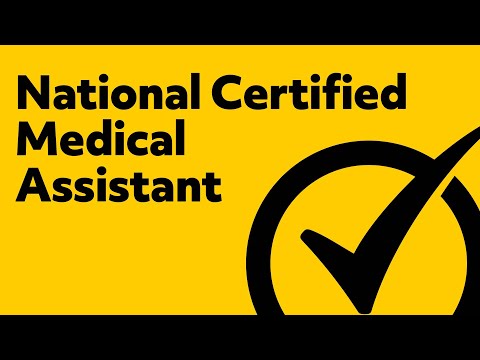A Certified Medical Laboratory Assistant Study Guide
Contents
- Introduction to the Certified Medical Laboratory Assistant Study Guide
- What is a Certified Medical Laboratory Assistant?
- The Duties of a Certified Medical Laboratory Assistant
- The Education and Training Required to Become a Certified Medical Laboratory Assistant
- The Certification Process for Medical Laboratory Assistants
- The Benefits of Certification for Medical Laboratory Assistants
- The Renewal Process for Certified Medical Laboratory Assistants
- The Importance of Continuing Education for Certified Medical Laboratory Assistants
- The Future of the Certified Medical Laboratory Assistant Profession
- Conclusion
A certified medical laboratory assistant is a medical professional who performs routine laboratory tests. This guide will provide you with the necessary information to become a certified medical laboratory assistant
Checkout this video:
Introduction to the Certified Medical Laboratory Assistant Study Guide
The Certified Medical Laboratory Assistant Study Guide is designed to help you complete your training and certification as a medical laboratory assistant. This guide provides information on the type of job you can expect as a certified medical laboratory assistant, the duties and responsibilities of this position, and the skills and knowledge you will need to succeed in this field. In addition, this guide includes information on the different types of medical laboratory assistantship programs available, as well as tips on how to choose the right program for you.
What is a Certified Medical Laboratory Assistant?
Medical laboratory assistants (MLAs) are health care professionals who work alongside medical laboratory technologists (MLTs) and other Health Care professionals in hospital laboratories, public health facilities, and community-based clinics. MLAs perform a variety of routine technical tasks to support the work of MLTs.
In order to become a certified medical laboratory assistant, individuals must complete an accredited MLA program and pass a national certification exam administered by the Canadian Society for Medical Laboratory Science (CSMLS).
Once certified, MLAs must maintain their certification by completing continuing education requirements and paying an annual certification fee.
The Duties of a Certified Medical Laboratory Assistant
A certified medical laboratory assistant (MLA) is a trained professional who works in a clinical laboratory setting and performs a variety of tasks related to the processing of patient specimens.
The duties of an MLA can vary depending on the size and type of facility in which they work, but typically include specimen collection, processing and testing, as well as basic data entry and record keeping.
In some cases, MLAs may also be responsible for phlebotomy (the act of drawing blood from a patient), and/or the operation of basic laboratory equipment such as centrifuges and microtomes.
while the majority of MLAs work in hospitals or other healthcare facilities, some may also find employment in research laboratories or pharmaceutical companies.
The Education and Training Required to Become a Certified Medical Laboratory Assistant
In order to become a certified medical laboratory assistant (MLA), you will need to complete an accredited post-secondary education program in medical laboratory technology. In addition, you will be required to pass a certification exam administered by the Board of Certification of the American Society for Clinical Pathology (ASCP). Once you have successfully completed these steps, you will be eligible to earn the Certified Medical Laboratory Assistant (CMLA) designation.
The education and training required to become a certified medical laboratory assistant typically takes two years to complete. Programs are typically offered at the associate’s degree level, although some schools may offer certificate or diploma programs as well. During your program, you will take courses in areas such as anatomy and physiology, chemistry, immunology, Medical Terminology and phlebotomy. You will also receive clinical training in a laboratory setting, where you will learn how to perform various medical laboratory tests and procedures.
The Certification Process for Medical Laboratory Assistants
Completing a certification program is the first step to becoming a medical laboratory assistant. The next step is passing the certification exam administered by a national nonprofit organization, such as the National Credentialing Agency for Laboratory Personnel or American Medical Technologists.
After passing the exam, you will be credentialed as a medical laboratory technician (MLT) or medical laboratory scientist (MLS), depending on your educational background. Many states also have certification requirements for medical laboratory personnel.
The Benefits of Certification for Medical Laboratory Assistants
Certification for medical laboratory assistants is not required in all states, but many employers prefer to hire those who have received certification. There are several benefits of becoming a certified medical laboratory assistant, including:
• improved job prospects – employers often give preference to candidates who have been certified by a professional organization, such as the National Credentialing Agency for Laboratory Personnel (NCALP).
• higher earnings potential – according to the U.S. Bureau of Labor Statistics, the median annual salary for medical laboratory assistants was $38,040 in May 2016, but those with certification may be able to earn more.
• greater job satisfaction – having the knowledge and skills required to perform tasks correctly can lead to a feeling of accomplishment and pride in one’s work.
• increased sense of responsibility – working in a profession that requires certification can instill a sense of duty to maintain one’s knowledge and skills through continuing education.
The Renewal Process for Certified Medical Laboratory Assistants
As a Certified Medical Laboratory Assistant (MLA), it is your responsibility to maintain your certification through continuing education and to renew your certification when it expires. The renewal process for MLAs is different from the initial certification process in a few ways, so it is important to be prepared.
To renew your certification as a medical laboratory assistant, you will need to:
-Submit an application for renewal to the American Society for Clinical Pathology Board of Certification (ASCP-BOC).
-Pay the renewal fee.
-Demonstrate that you have met the continuing education requirements.
You will need to submit your application for renewal to the ASCP-BOC at least 60 days before your certification expires. If you submit your application late, you will be required to pay a late fee.
To demonstrate that you have met the continuing education requirements, you will need to earn 50 continuing education credits over the five years since you were last certified. Of these 50 credits, 10 must be earned in each year. At least 25 of the 50 credits must come from formal educational activities, such as courses, workshops, or conferences. The other 25 credits can come from informal activities, such as self-study courses or reading journal articles.
Once the ASCP-BOC receives and approves your application, they will send you a new certificate that is valid for five years.
The Importance of Continuing Education for Certified Medical Laboratory Assistants
While state licensure is not required for Certified Medical Laboratory Assistants (CMLA), many employers prefer or require certification. The National Accrediting Agency for Clinical Laboratory Sciences (NAACLS) certifies medical laboratory assistants. To earn NAACLS certification, individuals must complete an accredited education program and pass a national examination administered by the American Society for Clinical Pathology’s Board of Certification (ASCP-BOC).
CMLAs who are certified through the ASCP-BOC are required to maintain their certification by earning continuing education credits (CECs). These CECs can be obtained by attending workshops, seminars, and conferences; completing online courses; or writing articles or books related to the medical laboratory field.
As the medical field evolves, it is important for CMLAs to keep up with new technologies and procedures. Continuing education helps CMLAs stay current in their field and improve their skills. It also allows them to network with other professionals and learn about new job opportunities.
The Future of the Certified Medical Laboratory Assistant Profession
The c MLA profession is projected to grow much faster than average for all occupations between 2014 and 2024, according to the United States Bureau of Labor Statistics (BLS). The BLS estimates that employment of CMAs will grow by 18 percent during this period, compared to an estimated seven percent growth for all occupations.
Conclusion
We hope that this certified medical laboratory assistant study guide has been helpful in preparing you for your exams. Good luck!







